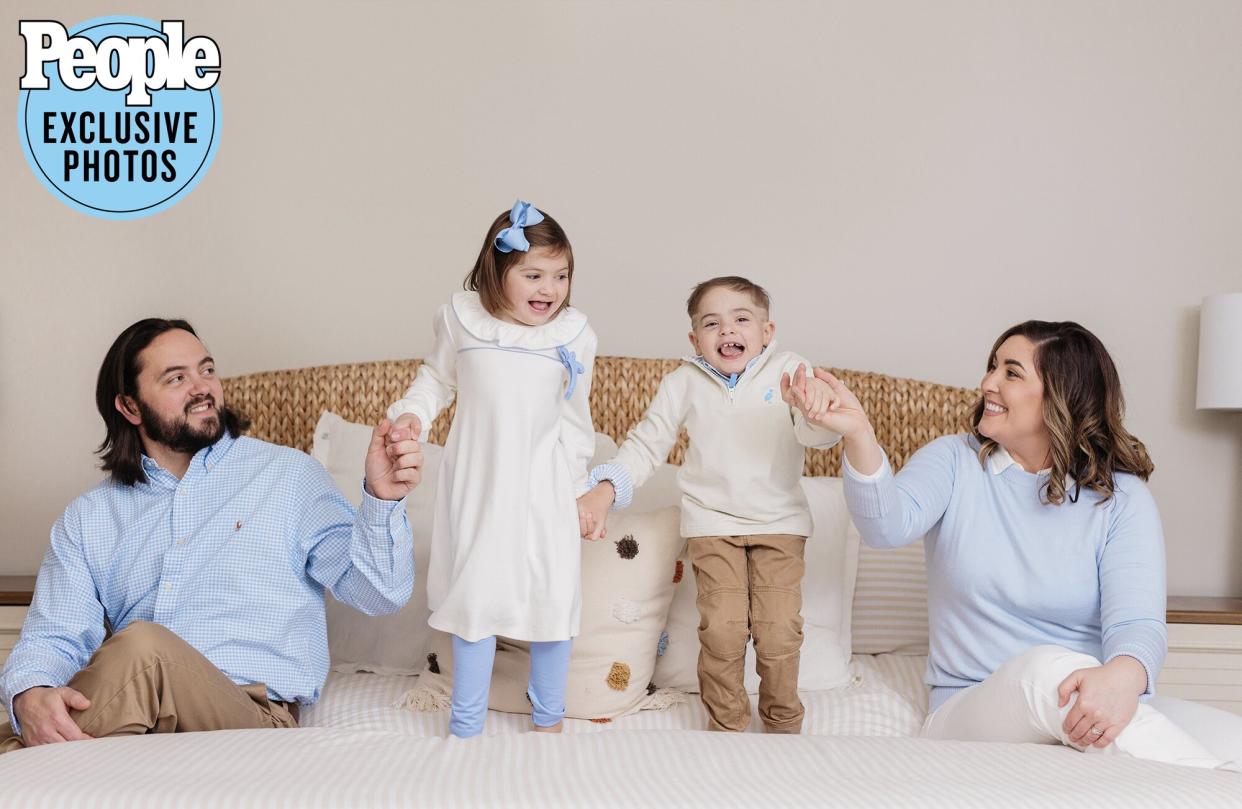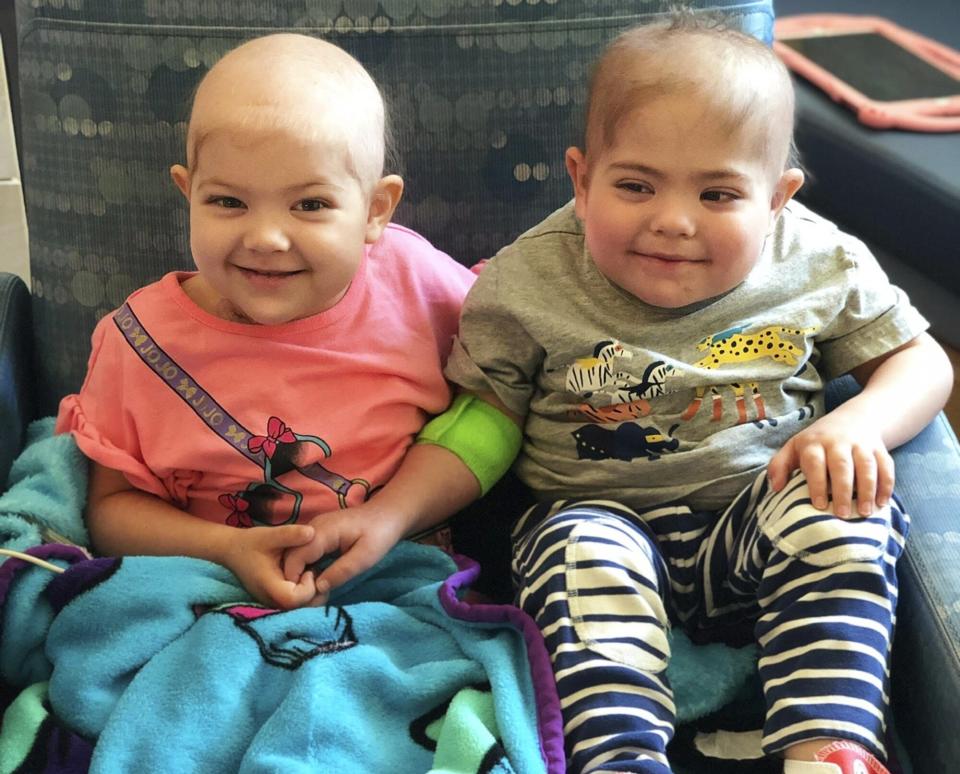Parents Raise $3 Million to Save Their Kids' Lives from Fatal Form of Dwarfism: 'We'd Do Anything'

Zoe Life Photography
When Jessica and Kyle Davenport's baby boy Kruz was born premature at 34 weeks, it didn't take long for them to know that something was seriously wrong.
The Muscle Shoals, Alabama, couple, noticed that by 9-months-old he wasn't growing properly, had a poor immune system and had extreme sensitivity to light.
"We went as far to check if he had a brain tumor," mom Jessica Davenport tells PEOPLE. "It was very alarming."
But after nearly two years and ten different specialists, the nearly 3-year-old Kruz was diagnosed with a genetic condition called Schimke immuno-osseous dysplasia (SIOD), a rare and fatal form of dwarfism.
Devastated and in complete shock, the couple decided to test their one-and-a-half-year-old daughter Paizlee out of precaution.
"There was one-in-80-million chance that she would have it," says Jessica, 35. "And then she tested positive. All I could think about was, 'I cannot lose both of my kids.' "
RELATED: 4-Year-Old Girl Nearly Dies After Strep A Leads to Flesh-Eating Bacteria: 'She Was Deteriorating'

Zoe Life Photography
Jessica, who learned that she and Kyle were both carriers of the gene mutation that causes SIOD — called SMARCAL1, had passed it on to both kids, "so that was pretty crazy odds right there," she says.
The rare condition, which only affects a few dozen people in the U.S. and Canada, causes kidney failure, a weakened immune system, skeletal dysplasia, migraines and a high risk of stroke and seizures.
And when they were told that both their children faced a life expectancy of just nine years with no cure in sight, they knew they had to take action and do everything in their power to fight.
So, in 2016, with help from their "really close-knit community," they started selling $5 bracelets and T-shirts and within months raised $100,000.
"We were mad at the situation, but very motivated," says Jeff, who with Jessica launched the Kruzn for a Kure Foundation, and have since brought in over $3 million, with the average donation being just $25.

Courtesy Davenport family
Never miss a story — sign up for PEOPLE's free daily newsletter to stay up-to-date on the best of what PEOPLE has to offer, from juicy celebrity news to compelling human interest stories.
"We'd do anything for our kids," says Jessica, who quit her job as a dental hygienist to care for her children full time.
In May 2017, Kruz's kidney failed, and the couple thought "we were going to lose him," she adds. "But I knew I had to wake up and just put one foot in front of the other."
The foundation partnered with Dr. David Lewis, an immunologist and leading expert in SIOD, at Stanford Medicine Children's Health, and with his team, including Dr. Alice Bertaina and Dr. Paul Grimm, they created a lifesaving kidney transplant procedure called a dual immune/solid organ transplant (DISOT).
"It's hard to get funding for rare diseases," Lewis tells PEOPLE, who needed $30,000 from the foundation every month, "but I've never met anyone more capable than Jessica."
RELATED: Parents of Baby Born with Rare, Often Fatal Dwarfism Want to Tell Other Families 'There is Hope'
Kruz, now 9, and Paizlee, 8, became not only the first known sibling pair diagnosed with the disease, but were also the first to be given the transplant. After selling their family home in Alabama and relocating to Palo Alto, Calif., in January 2019, Kruz had his blood stem cell transplant using Jessica's stem cells, and after his new immune system was deemed healthy, he received his mom's kidney in July.
"That was first time [DISOT] had been done anywhere in the world," says Lewis. "It doesn't cure all the problems of SIOD, but it's a cure for the blood, the immune system and the kidneys."
Paizlee's blood stem cell transplant followed in August 2019, using Kyle's stem cells — and in June 2020, she received her dad's healthy kidney.
For the full story on the Davenports incredible journey, pick up the latest issue of PEOPLE, on newsstands Friday, or subscribe here.

Courtesy Davenport family
Today, Kruz and Paizlee are walking miracles. After their transplant, they settled back in Alabama, and are going to school, playing with friends and are even bowling for the first time. They currently have no complications from the transplants, but both still face daily challenges due to SIOD.
Kruz struggles with hip dysplasia, despite having hip reconstruction in October 2020, and suffers from hemiplegic migraines that can cause temporary paralysis in his arm or face.
But the Davenports aren't slowing down anytime soon. They are facilitating more DISOT procedures through the Stanford lab, and are working on promising drug therapies will hopefully help all of the SIOD symptoms.
"When Kruz was first diagnosed, it was agonizing," says Jessica, who is now on a tireless mission to raise another $3 million. "We had no one, and no hope for our kids besides our faith. As a mother, I want to make sure these families who are newly diagnosed have somewhere to turn, so they can go to sleep at night and know that there's hope."


